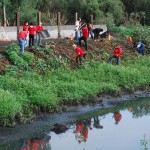This course has been designed to introduce students to the realities of urban planning in a developing country context. The field studio will place students in a real-world situation in which they will be expected to use their skills and creativity to help address a pressing problem faced by urban planners. As an international service-learning course, students will work closely with our partner organization that has helped structure course expectations, activities and outputs. In 2016 we will work with the Planning Institute of Morelia (IMPLAN) to provide ideas and input on an urban river management plan they are developing for the city of Morelia, Mexico.
The rivers and streams of Morelia suffer from problems that are common to urban waterways around the world. The stream network has been channelized into straight canals as it crosses dense urban areas. Water quality is low, and the channel is often filled with solid waste or other contaminants. Public use and appreciation for the urban river is low. Given this context, our partner organization in Morelia, IMPLAN, has identified Morelia’s river network as an opportunity for urban renovation and ecological restoration. To lead the city in restoring its urban waterways, IMPLAN has begun the process of developing an urban river management plan which will consider water quality, public access/use, and flood protection, among other issues.
Peri-urban neighborhoods are particularly vulnerable to flooding. Flooding in Morelia been especially devastating for poor communities living in informal settlements in the urban periphery (Hernández-Guerrero et al. 2012). Researchers in Mexico have examined the hydrology and social issues associated with flooding events (Hernández and Vieyra 2010) and we will benefit from their research to learn about the hydrological and social issues that constrain flood management in these neighborhoods. We will also benefit from multiple studies on the history and urbanization of the Chiquito watershed, which provides drinking water for the city, and serves as a central artery that crosses the city from East to West (Sánchez 2011, Sánchez and Urquijo 2014).
Through a series of field visits, conversations and lectures, the course will introduce students to the dilemmas and tradeoffs that confront city planners in Morelia, who are forced to make difficult decisions and balance competing human needs. The course will cover best practices in urban planning and urban river management. We will review material in planning (land use planning, hazard mitigation, informal settlements) but also draw on topics from the physical sciences (watershed management, hydrology, urban hydrology, geomorphology), and the social sciences (community mapping, urban sociology and risk perception). Following a series of lectures and field trips, students will be asked to contribute ideas and analysis that may assist the Municipal Planning Institute in their development of the urban river management plan.
See the complete outline of the course here
See the Wikipedia article for Morelia in Spanish or in English
- Morelia
- A 2012 cleaning of one of Morelia’s Rivers
- Morelia at night
- Morelia’s Acueduct



